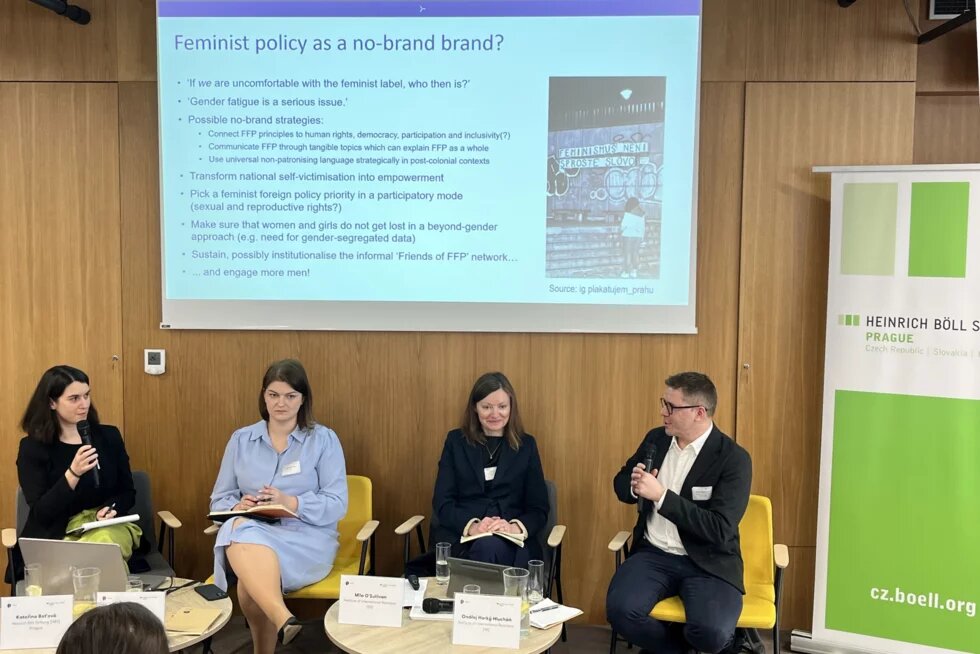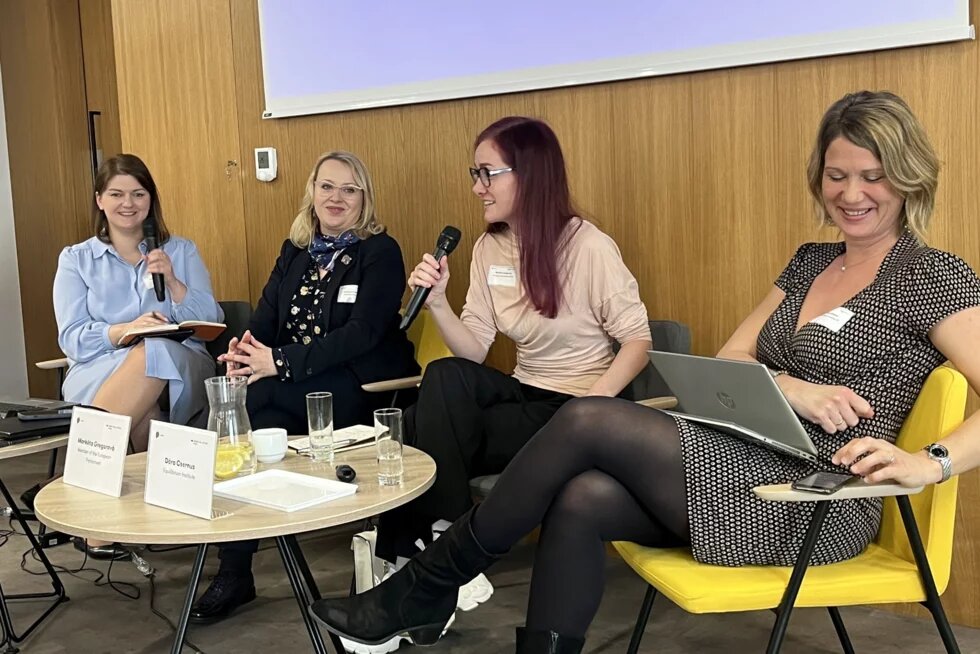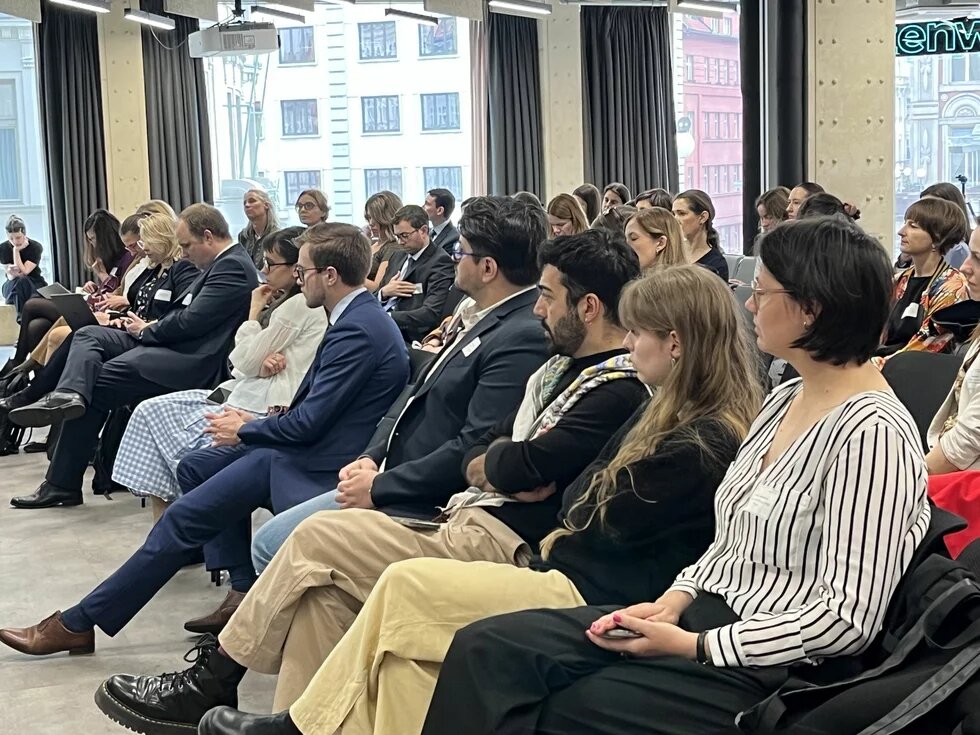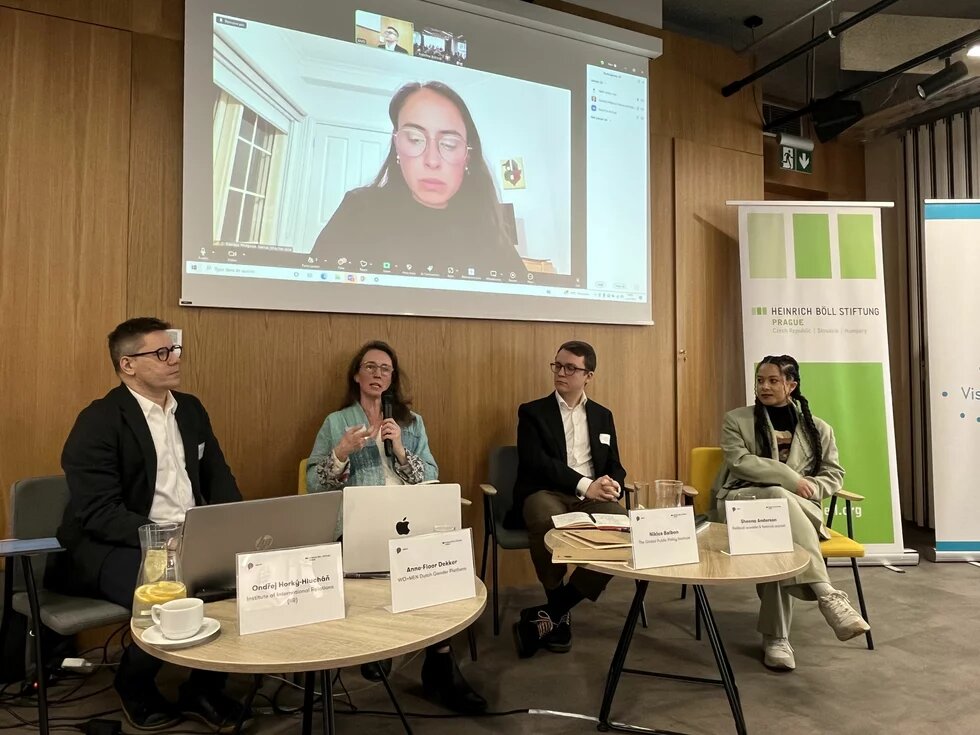
In the past decade, multiple states around the world have signed up to pursue a feminist foreign policy (FFP). Some, like Sweden and more recently also the Netherlands, have already retracted these promises. In the face of the surge of far-right parties and politicians in Europe and in the US, what does the future hold for FFP? Is there potential for FFP in the V4 countries? What makes a foreign policy truly feminist? An international conference organized by the Prague office of the Heinrich-Böll-Stiftung (HBS) in cooperation with the Association for International Affairs (AMO) on 25 March 2025 brought together policymakers, government representatives, academics, think-tank experts, and civil society organizations to discuss these issues.
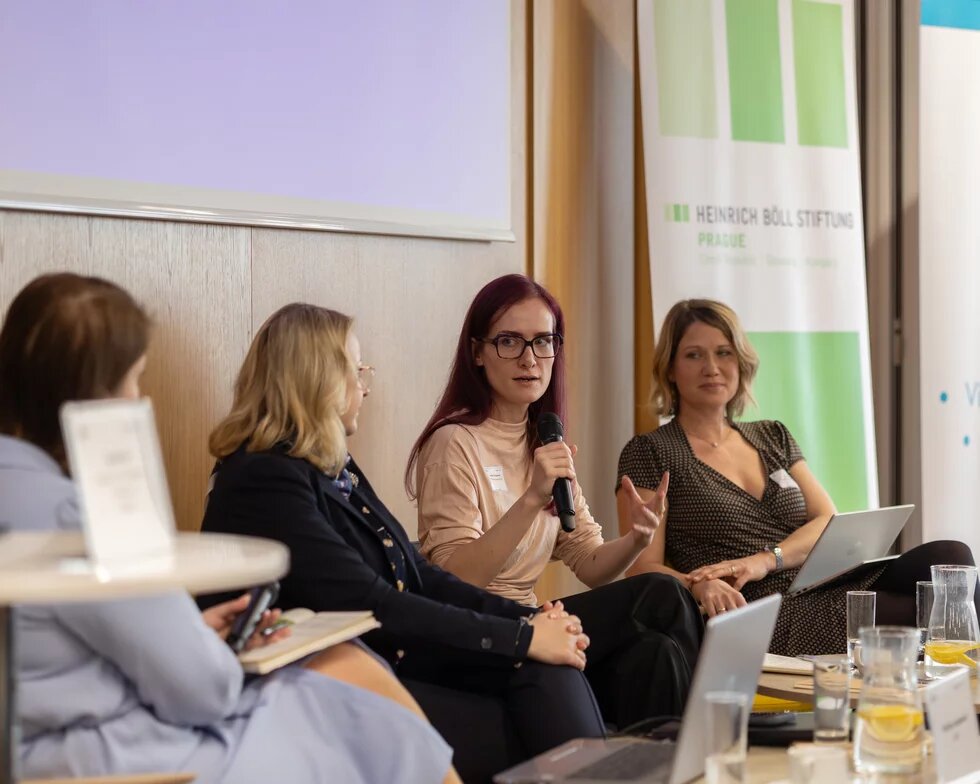
The conference "Feminist Approaches to Foreign Policy in Central Europe: Challenges, Insights, and the Road Ahead" opened with welcoming remarks by Pavlína Janebová (AMO), Klaus Linsenmeier (HBS Prague) and Kamila Xenie Vetišková (Ministry of Foreign Affairs of the Czech Republic).
Global perspectives and experience from the Netherlands, Germany, and Mexico
The first panel focused on insights from three countries that have officially adopted feminist foreign policies: the Netherlands, Germany, and Mexico. It also shed some light on global and decolonial perspectives on FFP. All four speakers – Sheena Anderson (political scientist, feminist activist and organizer), Niklas Balbon (Global Public Policy Institute), Anne-Floor Dekker (WO=MEN) and Daniela Philipson García (Monash University) – agreed that the FFP label is of political and symbolic value. Embracing the FFP label also signals countries’ political commitment to gender equality and puts more focus on issues such as socio-economic security or climate justice. In the Mexican case, adopting the label helped galvanize civil society and make feminist activists and organizers more interested in foreign policy. However, it was not immediete. Civil society mobilized in the context of the FFP Conference in Mexico City in 2024, after it was excluded from the conference. Moreover, FFP worked well as a soft diplomacy tool and helped Mexico improve its international reputation and secure a spot as a non-permanent member of the UN Security Council.
However, the actual track record of countries that have officially adopted FFP on promoting women’s rights and gender equality leaves much to be desired. The speakers commented on the lack of intersectionality in FFP-related discussions, and Sheena Anderson pointed out the absence of conversations about race in particular. The panelists also drew attention to the dearth of space for decolonial approaches, to severe underfunding, the narrow focus on women’s descriptive representation, and a general lack of willingness to follow through on feminist principles in the face of geopolitical and economic realities. For example Sweden, which subscribed to FFP between 2014 and 2022, criticized Saudi Arabia for human rights violations and yet continued to export arms to the Saudi-led coalition in Yemen.
Anne-Floor Dekker also remarked that not enough time and resources were put into training Dutch government employees to implement the feminist lens and fight anti-feminist disinformation. This made it easier for the new Dutch government to end the FFP and for instance stop developmnet policy programs aimed at gender equality. In addition to lack of resources, Niklas Balbon mentioned the incoherence of Germany’s FFP using the example of its involvement in the Gaza genocide, as well the persistence of patriarchal structures within the foreign ministry. Lastly, Daniela Philipson García pointed out the incongruity between Mexico’s foreign and domestic policies in terms of human rights, namely the fact that approximately ten women are killed every day in Mexico.
The speakers agreed that, going forward, countries looking to adopt FFPs should not make promises that they are not ready to keep, and that they should make available the resources needed to implement feminist policies in a meaningful way. Since FFP should be based on a participatory approach, this also means that civil society experts must be paid for their consultations. In addition, it was made clear that we need not only involve more men in FFP discussions, but also engage more deeply with masculinities. Finally, all panelists agreed that, in the face of the global surge of far-right parties and politicians, we need feminist policies, because they offer holistic solutions to today’s crises.
Is Foreign Policy in the V4 a Man’s World?
The second session of the conference presented two papers exploring the intersection of gender, feminism, and foreign policy in the V4 countries. Kateřina Boťová (HBS) opened the discussion by noting that “feminism has a largely negative connotation in the region and its meaning is not deeply rooted in the common knowledge.” Speakers addressed critical issues related to feminist approaches towards foreign policy in the V4, such as insufficient funding, limited support by governments, and unequal opportunities for female diplomats, before providing practical recommendations for future steps.
Pavlína Janebová (AMO) presented that organization’s most recent policy paper on gender balance in diplomacy and international relations, highlighting that it is important to enhance networking and mentoring opportunities where women can address gender-specific issues and share solutions. Examples of women’s networks from Czechia and Poland can be an inspiration for Slovakia and Hungary, where no similar networks exist. To achieve equal opportunities for female diplomats, comprehensive support systems—including childcare, healthcare, and education—should be established. Furthermore, she stressed the importance of engaging male allies for effective advocacy, since “men are still more likely to listen to other men than to women.”
Focusing specifically on Czechia, Ondřej Horký-Hlucháň and Míla O’Sullivan (Institute of International Relations Prague) introduced their discussion paper on FFP principles in Czechia.
They stated that it is necessary to bring feminist NGOs on board to engage in foreign policy and to use tangible topics to explain how FFP benefits the whole society. Agreeing with the previous presentation, they also called for the establishment and institutionalization of networks around FFP, as well as for the engagement of men. They also raised the question of whether it is useful to use the feminist label or not. The session concluded with audience remarks stressing the need for more inclusive engagement of further marginalized groups such as Roma and people with various identities.
Navigating the Road to Feminist Foreign Policy in the V4
The third session of the conference focused on the potential for FFP in Central Europe. Moderated by Pavlína Janebová (AMO), the panel featured experts and policy makers Aleksandra Gasztold (University of Warsaw), Dóra Csernus (Equilibrium Institute), Markéta Gregorová (Member of the European Parliament, Czechia), and Lucia Yar (Member of the European Parliament, Slovakia).
Opening the discussion with the question “What are the lessons we can take from our experiences that can be implemented into V4 countries’ foreign policies?”, the panelists shared insights shaped by their countries’ political contexts and highlighted key obstacles to advancing feminist approaches, including minimal institutional support, emotional resistance in politics, and a lack of systemic change. Speakers acknowledged that the term “feminism” remains politically sensitive and even stigmatized in many parts of the V4 region. Lucia Yar pointed out that in Slovakia, feminist and even human rights rhetoric has become taboo, while Aleksandra Gasztold noted that in Poland, feminism is frequently publicly framed and delegitimized trough its association with “Bolshevism”.
The Slovak case showed that windows of opportunity to promote some gender-sensitive and feminist measures in foreign policy, which was the case for a short time in Slovakia, can be closed very quickly. Other countries should be aware of this and use opportunities as long as they have them, according to Lucia Yar. Aleksandra Gasztold identifies the potential for Foreign Policy Analysis (FPA) to incorporate insights from foreign folicy feelings, emphasizing that emotional dynamics play a critical role in political decision-making in V4 countries. Contrary to the traditional rationalist assumptions that states act solely based on strategic interests, Gasztold argues that affective factors—such as national pride, historical grievances, and collective emotions—also shape state behavior and international outcomes. As in the previous session, she called for looking for alliances with men, networking, and mentoring programs as well as developing education modules on diversity and intersectionality as ways of moving forward. Addressing the situation of especially young men was further stressed by Markéta Gregorová. At the same time, she related the question to the current actions of the Trump administration and a fear of losing democratic institutions that could concern Czechia as well. Seeking more feminist representation on the policy level, beyond representation of women just on the basis of gender, should be the aim, too. In addition, Dóra Csernus pointed out the need to approach the realm of security, also with regard to climate issues, energy, and food security, where feminist voices can shape positive change. At the same time, she also reminded us that feminism is not just about gender, but is also about improving the quality and decency of politics in general. In addition, she asked for a diversified view on countries, as governments never represent all the views existing in each society.
A recurring theme was the need for bottom-up advocacy, as well as to push for systemic change. Lucia Yar emphasized the impact of everyday activism and micro-feminism, while Markéta Gregorová stressed the importance of structural reforms, such as gender quotas and systemic recognition of privileges.
Addressing the final question “To what extent are the V4 countries able to reflect on their global responsibilities, as it is one of the main aspects of FFP? Do they still see themselves as victims deserving special treatment?”, Lucia Yar agreed with the persisting victimization narrative and mentioned that the main focus of the Slovak MFA is, unfortunately, business. It sees no need to support post-colonial countries, as it does not consider itself responsible for the mismanagement of those parts of the world. Aleksandra Gasztold sees the opportunity for Poland in peace negotiations in Europe within the EU framework. Markéta Gregorová added that Czechia doesn’t have an FFP, so it doesn’t implement it. Moreover, she highlighted that some actors benefit from the current status quo and actively work to portray societies as "not ready" for feminist approaches. Instead, FFP should be understood as a framework for systemic change and inclusive policymaking. All in all, the speakers agreed that the question is not about readiness, but about willingness to implement feminist policies.
The conference was an output of the project “Connecting Networks of Women in Foreign, European, and Security Policy across the V4 States” and was co-financed by the Governments of Czechia, Hungary, Poland and Slovakia through Visegrad Grants from the International Visegrad Fund. The mission of the fund is to advance ideas for sustainable regional cooperation in Central Europe.
This report was written by interns Nina Bohunská, Barbora Vosáhlová (AMO) and Soňa Palyzová (HBS Prague) and edited by Kateřina Boťová (HBS Prague) and Barbora Trčková (AMO).
